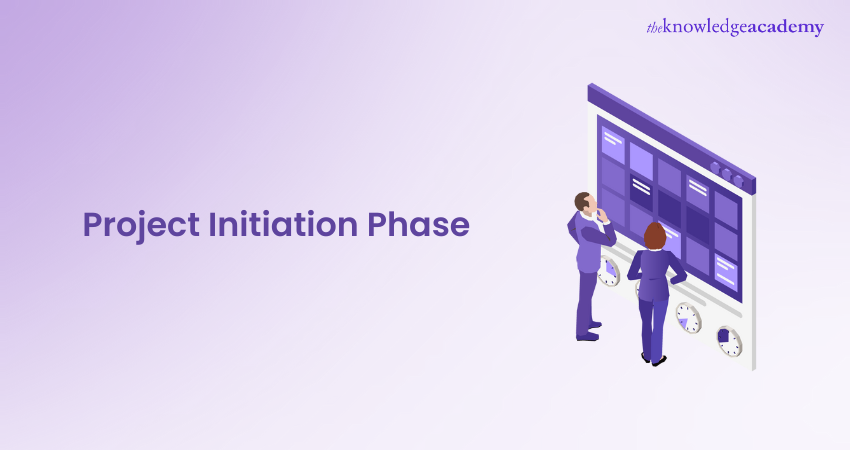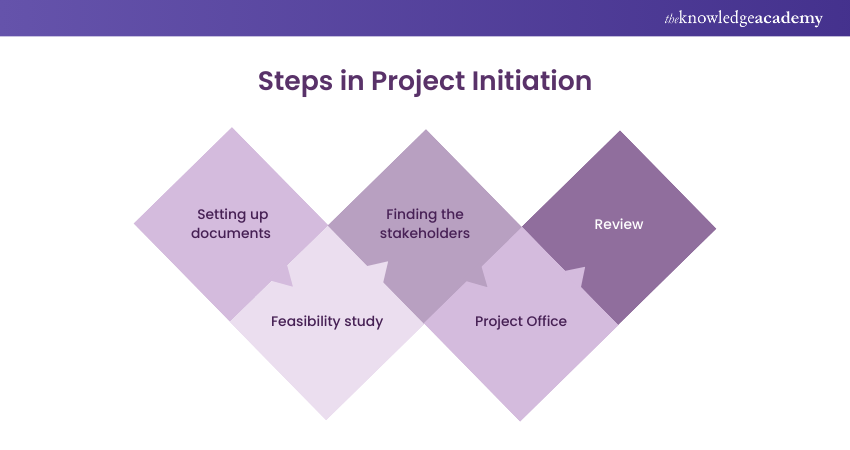We may not have the course you’re looking for. If you enquire or give us a call on 01344203999 and speak to our training experts, we may still be able to help with your training requirements.
Training Outcomes Within Your Budget!
We ensure quality, budget-alignment, and timely delivery by our expert instructors.

In Project Management, different Phases are involved to build a Project. When a Project starts, each Phase is allocated to a specific team to complete a Project effectively. The Initiation Phase is considered the base of Project Management.
Without knowledge about the Initiation Phase, it is hard to complete a Project. So, professionals involved in managing projects must learn how to carry forward tasks during this phase. Go through this blog to know more about the Project Initiation Phase in Project Management. Also, explore the importance of this phase, along with important tools used.
Table of Contents
1) What is the Project Initiation Phase?
2) Why Project Initiation is important?
3) Steps in Project Initiation
4) Roles involved in the Project Initiation Phase
5) Conclusion
What is the Project Initiation Phase?
Project Initiation is the starting phase of the Project Management process. In this phase, companies study the Project and secure the buy-in information from clients. This phase is a part of the five phases of the Project Management lifecycle developed by the Project Management Institute (PMI).
The main objective of this phase is to study the Project’s feasibility and understand the business value. Usually, a Project Manager creates a Project proposal that contains Project approval and Project plan in this phase.
Why is Project Initiation Important?
Embarking on a fresh Project is thrilling, but you must verify its potential value before delving into the planning stage. This is where Project Initiation Phase plays a vital role, providing a methodical framework to the Project's business rationale. Moreover, Project Initiation ensures early engagement with stakeholders. It also facilitates the acquisition of necessary resources, enhancing project visibility, and preventing potential obstacles in the future
Project Initiation Documentation
Project Initiation documents serve as a catalyst in transitioning Projects from ideation to execution. Let’s explore the common Project Initiation documents that can establish the groundwork for your Project plan:
a) Business case: A business case is a comprehensive document that outlines the rationale behind initiating a project. It provides a detailed analysis of the proposed project, including its objectives, potential benefits, risks, costs, and expected outcomes. This document serves as a critical tool to evaluate the feasibility and potential returns of investing resources into the Project. It helps stakeholders understand the strategic alignment of the Project with organisational goals and objectives.
b) Project charter: A Project charter is a formal document that authorises the existence of a Project. It also provides the Project Manager with the authority to proceed with project activities. Moreover, the Project charter helps to maintain focus and direction behind facilitating effective communication and decision-making.
c) Team Charter: A team charter is a document that defines the purpose, objectives, roles, and responsibilities of a Project team. It outlines the team's mission, vision, and values, as well as expectations for collaboration, communication, and conflict resolution. Additionally, the team charter serves as a reference point for resolving conflicts or addressing issues that may arise during the Project lifecycle. Overall, the team charter plays a crucial role in ensuring alignment, clarity, and effectiveness within the Project team.
d) Project Initiation Document (PID): A Project Initiation Document (PID) is a comprehensive document that serves as a reference point for all Project stakeholders. It typically includes key information such as project objectives, scope, deliverables, stakeholders, constraints, assumptions, risks, and dependencies. Moreover, the PID serves as a baseline for monitoring progress, and making informed decisions to ensure the Project's success.
Learn the basics of Project Management through our Project Management Office Fundamentals Certification – join us now!
Steps in Project Initiation
Project Initiation marks the inception Phase of a Project Management Cycle. Mostly, the Project Management Cycle refers to the series of phases a Project goes through. Those stages include Initiation, planning, execution, and monitoring. Each phase involves specific activities and deliverables aimed at ensuring the Project's success and alignment with its objectives.
However, Project Initiation is the starting point within the Project Management cycle. To Initiate a Project’s progression, it includes numerous steps. Let’s talk about those steps in detail:

1) Setting up documents: As mentioned earlier, the Project Initiation documents represent significant outputs of this phase. So, you must establish your Project by utilising a Project charter, business case, team charter, and other relevant Project documentation.
2) Feasibility study: Feasibility study is to find the Projects’s causes and identify its success. This study identifies the top-level constraints and assumptions of the Project and determines whether the Project is worthwhile or not.
3) Finding the stakeholders: Communication plays a key role in completing a Project. The Project Management Body of Knowledge (PMBOK) identifies stakeholders as anyone who may be influenced by the project. A Project Manager is the person responsible for creating constant communication with the stakeholders.
4) Project Office: Project office is the place where Project Manager, team members, clients can meet to guide the Project. Finding the right skilled candidate and assigning the roles and responsibilities based on the Project plans
5) Review: Review the project at initiation phase is ensure that you made everything perfect. Appropriate feedback also helps to initiate and handle Projects smoothly in the future.
Keen to learn more about Project Management? Check out our Project Management Masterclass Courses.
Roles involved in the Project Initiation Phase
Different roles within a company play crucial parts in setting the Project's foundation. Some of those crucial roles are as follows:
1) Project Team: Team members are members who create a project by completing their tasks. Team members have different kinds of experience to handle any kind of project. They work under the Project Team Leader and Project Manager.
2) Project Leader: Project Leader has the power to control the team members. Their responsibility is to assign tasks and subtasks by identifying the team members based on their skills. Project is also holding the responsibility of collecting the detailed reports and analytics of the project and communicating to the Project Manager to share the progress of project.
3) Project Manager: A Project Manager is the person who controls an entire project from start to finish. Project Leader usually handles a single project, but Project Manager is responsible for handling multiple projects simultaneously. A Project Manager must communicate with managements, clients, Project Leader, and team members.
Conclusion
Here, we discussed some detailed information about the steps, features, tools, roles, and lifecycle of a Project Initiation Phase. We hope this blog helps you to better grasp how to initiate and lead a Project.
Check out our Project Management Courses to effectively upgrade your skills!
Frequently Asked Questions

As the initial step, Project Initiation phase includes multiple pitfalls. Some of those pitfalls include poor Project planning, poorly defined Project goals, defective communication, unrealistic expectations, and so on.

You can adopt a handful of tactics to measure the Project Initiation phase’s progress and success. The most common strategies include scheduling baseline, projecting budget, assuring quality, satisfying the stakeholder, and so on.

The Knowledge Academy takes global learning to new heights, offering over 30,000 online courses across 490+ locations in 220 countries. This expansive reach ensures accessibility and convenience for learners worldwide.
Alongside our diverse Online Course Catalogue, encompassing 17 major categories, we go the extra mile by providing a plethora of free educational Online Resources like News updates, Blogs, videos, webinars, and interview questions. Tailoring learning experiences further, professionals can maximise value with customisable Course Bundles of TKA.

The Knowledge Academy’s Knowledge Pass, a prepaid voucher, adds another layer of flexibility, allowing course bookings over a 12-month period. Join us on a journey where education knows no bounds.

The Knowledge Academy offers various Project Management Courses, including the Project Management Office Fundamentals Course, Programme Management (PgM) Fundamentals Training, and Jira Training. These courses cater to different skill levels, providing comprehensive insights into the Digital Project Management Process.
Our Project Management Blogs cover a range of topics related to Power BI, offering valuable resources, best practices, and industry insights. Whether you are a beginner or looking to advance your Power BI skills, The Knowledge Academy's diverse courses and informative blogs have got you covered.
Upcoming Project Management Resources Batches & Dates
Date
 Project Management Certification Course
Project Management Certification Course
Fri 17th May 2024
Fri 21st Jun 2024
Fri 19th Jul 2024
Fri 16th Aug 2024
Fri 13th Sep 2024
Fri 11th Oct 2024
Fri 8th Nov 2024
Fri 13th Dec 2024







 Top Rated Course
Top Rated Course



 If you wish to make any changes to your course, please
If you wish to make any changes to your course, please


